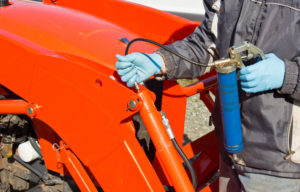As April ushers in the sowing season for many crops, ensuring that your tractor(s) and other vital farm machinery are in optimal condition becomes paramount. One aspect of machinery maintenance that cannot be overstated is using the right lubricants to ensure optimal machine health. This article delves into the significance of superior quality lubricants for farm equipment/machinery, their role in enhancing machinery efficiency, and best practices for their application during the critical sowing period.
The Role of Lubricants in Tractor/Farm Machinery Maintenance:
Lubricants play a crucial role in the maintenance and performance of tractors, particularly during the sowing season. They serve several essential functions:
1. Reducing Friction: Lubricants create a thin barrier between moving parts, significantly reducing friction. This not only prevents wear and tear but also enhances the efficiency of the tractor/farm machinery/equipment, ensuring that it operates smoothly during the critical sowing period.
2. Cooling Engine Components: By reducing friction, lubricants also help dissipate heat generated by the engine and other moving parts. This cooling effect is vital for maintaining an optimal operating temperature and preventing overheating, especially under the heavy workload of a busy farm.
3. Protection Against Rust and Corrosion: High-quality lubricants contain special additives that protect metal surfaces from moisture and contaminants, preventing rust and corrosion. This protection is crucial for the longevity of the tractor and its components.
4. Cleaning the Engine: Many modern lubricants have detergents and dispersants that help clean the engine by removing sludge and varnish. This keeps the engine running efficiently and extends its lifespan.
To find out the correct lubricants, coolants or grease that would help you achieve optimum production goals and protect farm machinery, several factors need to be considered, some of which are as follows:
Viscosity: The lubricant’s viscosity should match the manufacturer’s specifications for your tractor’s engine. Oil viscosity is how thick or thin an oil is, which affects how easily it flows. The right viscosity helps ensure the oil can flow smoothly around the vital components, providing optimal protection against wear and tear. If oil is too thick, it might not flow well in cold temperatures, whereas if it is too thin, it might not provide enough lubrication when it is hot.
Type: Use lubricants specifically designed for agricultural machinery. These typically have additives tailored for the heavy-duty requirements and environmental conditions encountered in farming. Manufacturers would recommend certain oils best suitable for their machinery, you can find these recommendations in the OEM/owner’s manual.
Quality Standards: An easy temptation for operators to save on upfront maintenance costs is to look towards cheaper brands of lubricants. This, however, results in short-term gain and long-term loss as most will fail and cause breakdown at the most crucial time. Cheaper lubricants do not go through the rigorous tests that fully approved lubricants go through and are usually blended to the minimum requirements of manufacturer specification to cut costs. One must always opt for lubricants that exceed the quality standards set by manufacturers. These high-quality lubricants have special additives to promote high performance and reduce wear and tear.

Now that you know what lubricant to select for your vital farm machinery, you must know the best practices for its application, which are:
1. Follow the Manufacturer’s Recommendations:Always remember to use the type and grade of oil recommended by the OEM for optimum performance and protection. Additionally, OEMs would often approve oils and coolants from certain brands which would pass the stringent quality test to get those approvals. TotalEnergies and Petro-Canada are two such brands whose products carry an array of OEM approvals. Using such products will also help you protect the warranty of your machinery/vehicle(s).
2. Regular Checks and Changes: Check lubricant levels regularly, especially before the intensive work of the sowing season. Change lubricants and filters according to the manufacturer’s recommended schedule or more frequently if operating under harsh conditions. By doing this, you ensure your machinery always performs to the best of its ability while also protecting its vital components, which, if damaged can be costly to fix.
3. Clean Before Applying: Ensure that fill points and surrounding areas are clean before checking or adding lubricants. This prevents contaminants from entering the system.
4. Monitor for Leaks: Regularly inspect the tractor(s) for signs of oil or lubricant leaks. Leaks can indicate a need for maintenance, leading to reduced lubrication efficiency and potential damage.
Correct, effective and regular lubrication is a cornerstone of farm machinery maintenance, especially during the demanding sowing season. By reducing friction, cooling engine components, and protecting against rust and corrosion, lubricants play a vital role in ensuring the efficiency and longevity of agricultural machinery. Selecting the right lubricant, following the manufacturer’s recommendations, and adhering to best practices for application can significantly impact the success of your farm production.
One such lubricant distributor that can supply not only high-performance goods but also much-needed technical expertise is Finol Oils. We are the authorised partners of TotalEnergies and Petro-Canada lubricants in Ireland and have a significant nationwide presence. We also have a dedicated technical department to resolve any queries you may have. Finol stocks a vast range of lubricants designed specifically for the Irish agricultural sector, including engine oils, hydraulic oils, backend or transmission oils, coolants, grease, adblue and Actioil diesel system treatment.
All of these are available in various pack sizes for nationwide bulk and packaged delivery. Operating since 1977, Finol has helped 1000s of Irish farmers and contractors achieve optimum efficiency of their farm machinery to achieve business goals. If you would like to connect with our sales or technical team, please contact us at 01 4555484 or finol@finol.ie.
